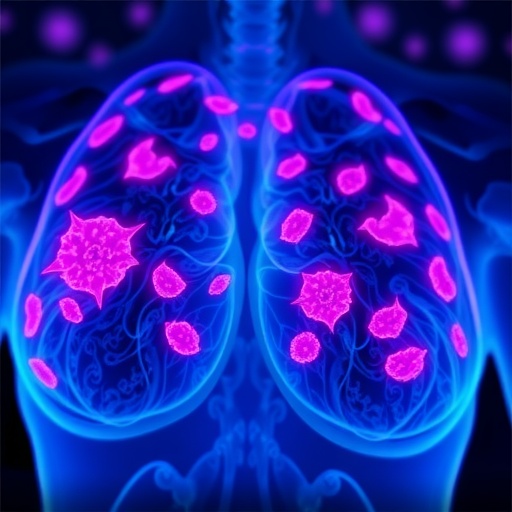
A groundbreaking study from the Garvan Institute of Medical Research has unveiled a critical mechanism behind treatment resistance in estrogen receptor-positive (ER+) breast cancer, revealing new avenues for precision therapy. This investigation illuminates how the suppression of a key cellular stress signaling cascade—the c-Jun N-terminal kinase (JNK) pathway—enables cancer cells to circumvent the damaging effects of combined endocrine therapy and CDK4/6 inhibitors, which are frontline treatments for this breast cancer subtype.
ER+ breast cancer represents approximately 70% of all breast cancer cases worldwide and is frequently managed with endocrine therapies that disrupt estrogen signaling, a major driver of tumor growth. Although these therapies have improved patient outcomes, a significant challenge remains: a substantial fraction of tumors develop resistance, leading to relapse and metastatic progression. The recent approval and use of CDK4/6 inhibitors in combination with endocrine therapy have further enhanced progression-free survival in high-risk patients. However, not all patients benefit, spotlighting an urgent need to understand the molecular basis of this resistance phenomenon.
At the heart of the team’s investigation is the JNK signaling pathway, a critical cellular mechanism generally understood as both a modulator of stress-induced apoptosis and a regulator of cell cycle arrest. This pathway functions akin to an intracellular alarm system, activated upon cellular stressors such as DNA damage, oxidative stress, or cytotoxic therapies. Activation of the JNK pathway promotes processes that either halt cell proliferation or induce programmed cell death, mechanisms crucial for eliminating damaged or potentially oncogenic cells.
.adsslot_LY876lCWMr{width:728px !important;height:90px !important;}
@media(max-width:1199px){ .adsslot_LY876lCWMr{width:468px !important;height:60px !important;}
}
@media(max-width:767px){ .adsslot_LY876lCWMr{width:320px !important;height:50px !important;}
}
ADVERTISEMENT
The researchers, led by Associate Professor Liz Caldon and Dr. Sarah Alexandrou, employed an innovative genome-wide CRISPR-Cas9 screen to systematically inactivate every gene across the genome in cultured ER+ breast cancer cells. This approach enabled them to pinpoint which genes, when silenced, confer resistance to combined endocrine and CDK4/6 inhibitor therapies. Strikingly, they discovered that disruption of multiple components of the JNK pathway, particularly the upstream kinase MAP2K7, allowed cancer cells to ignore therapeutic stress signals, continuing unabated proliferation and survival despite treatment.
Further validation involved analysis of tumor biopsies obtained from 78 ER+ breast cancer patients. Tumors exhibiting diminished JNK pathway activity correlated strongly with inferior therapy response and worse clinical outcomes. These findings collectively suggest that impaired JNK signaling functions as a molecular shield, permitting cancer cells to evade the cytostatic and cytotoxic effects of endocrine agents and CDK4/6 inhibitors by effectively silencing the stress alarms that would otherwise trigger senescence or apoptosis.
The revelation that the JNK pathway can act as a tumor suppressor contrasts with its previously held reputation in some cancer contexts as primarily tumor-promoting, underscoring the complexity of signal transduction networks within different cellular milieus. Within ER+ breast cancer, the balanced activity of the JNK pathway appears imperative; both hyperactivation and loss can perturb homeostasis, but loss notably drives therapeutic resistance. This dualistic role highlights a critical nuance in the pathway’s biology that can inform future therapeutic strategies.
Beyond mechanistic insights, the study offers translational promise. By developing biomarkers to assess JNK pathway functionality, clinicians could stratify patients prior to therapy initiation, identifying those unlikely to benefit from standard endocrine and CDK4/6 inhibitor regimens. This stratification would pave the way for personalized medicine, steering resistant patients toward alternative or adjunctive treatments and thereby optimizing clinical outcomes while minimizing unnecessary toxicity.
The Garvan team is spearheading ongoing research to unearth alternative therapeutic options tailored to cancers with suppressed JNK signaling. These efforts include screening for drugs capable of reactivating the pathway or exploiting vulnerabilities engendered by its silencing. The ultimate goal is a paradigm in which a patient’s tumor signaling profile guides bespoke treatment algorithms, maximizing efficacy and extending survival.
Importantly, this research underscores the value of integrating sophisticated genetic screening tools like CRISPR with patient-derived data to unravel complex biological resistance mechanisms. By combining high-throughput functional genomics with clinical sample analysis, the study establishes a robust framework for future oncology research aimed at overcoming drug resistance.
The implications of these findings extend beyond ER+ breast cancer, suggesting that similar stress response pathways may govern therapeutic resistance in other malignancies. As drug resistance remains a pervasive barrier in oncology, insights from the JNK pathway and its regulatory networks open new frontiers for investigation across cancer types.
This work was made possible through funding from diverse sources, including the National Breast Cancer Foundation and philanthropic awards, highlighting the synergistic role of public and private support in advancing cancer research. The team also acknowledges the important contributions of consumer advocates, emphasizing patient involvement in shaping impactful research agendas.
The promise embodied by this study is profound: in the near future, assessing the activity of cellular stress pathways like JNK may become routine in clinical oncology, informing decisions that tailor treatments to the molecular fingerprints of each tumor. For patients battling ER+ breast cancer, such precision could redefine prognosis and transform therapeutic landscapes.
Subject of Research: People
Article Title: JNK pathway suppression mediates insensitivity to combination endocrine therapy and CDK4/6 inhibition in ER+ breast cancer
News Publication Date: 18-Aug-2025
Web References:
http://dx.doi.org/10.1186/s13046-025-03466-9
Image Credits: Garvan Institute
Keywords: Breast cancer, Drug resistance, Signal transduction, JNK pathway, Signaling pathways, Cancer treatments, Medical treatments, Cancer medication, Cancer, Estrogen receptors, Senescence
Tags: cellular stress response in cancerchallenges in breast cancer treatmentendocrine therapy and CDK4/6 inhibitorsestrogen receptor-positive breast cancer mechanismsGarvan Institute of Medical Research studyimproving patient outcomes in breast cancerJNK signaling pathway in cancermolecular basis of cancer resistanceprecision therapy for breast cancerrelapse in ER+ breast cancertreatment resistance in breast cancertumor growth and estrogen signaling





